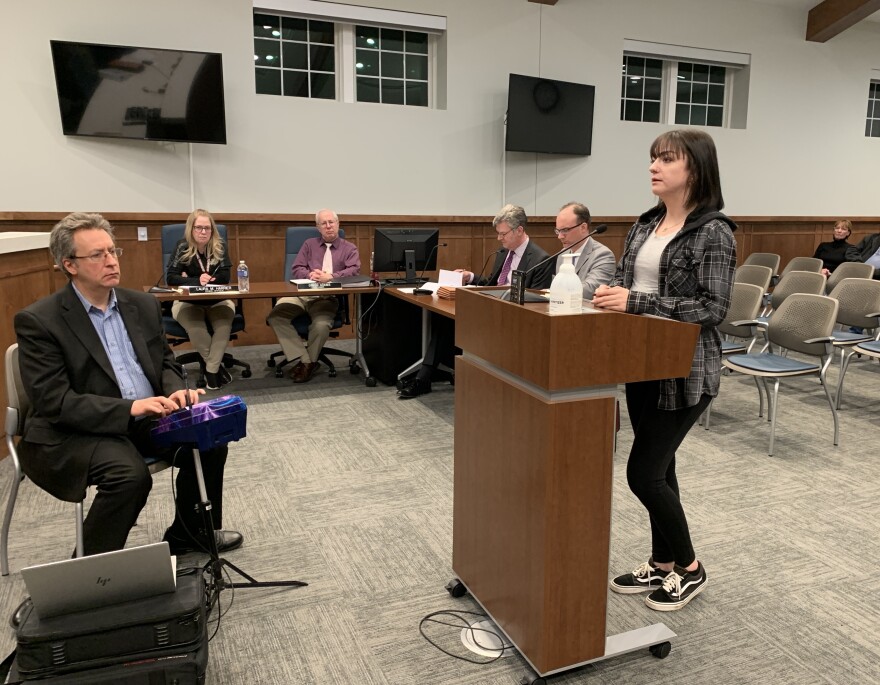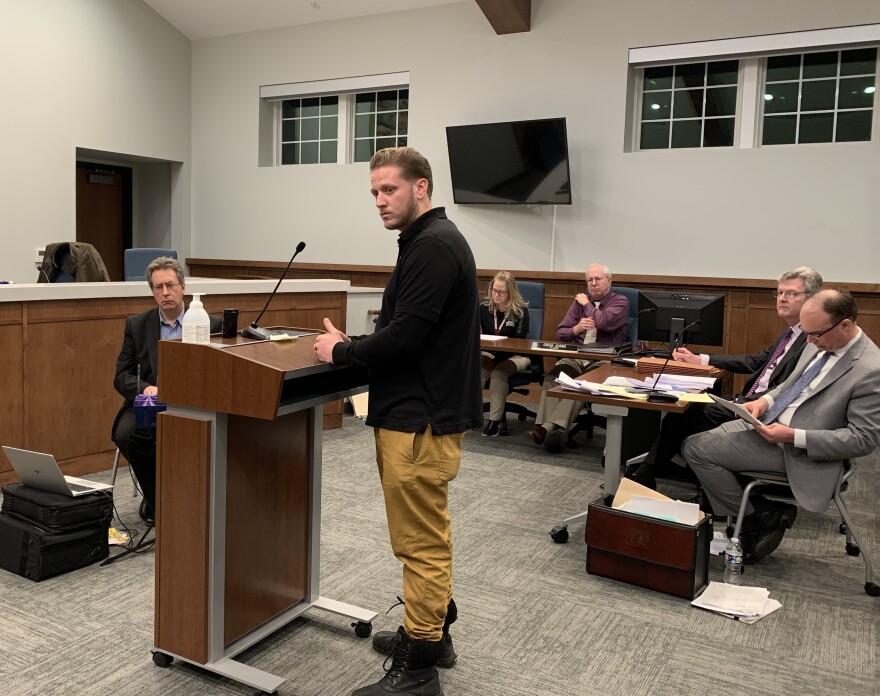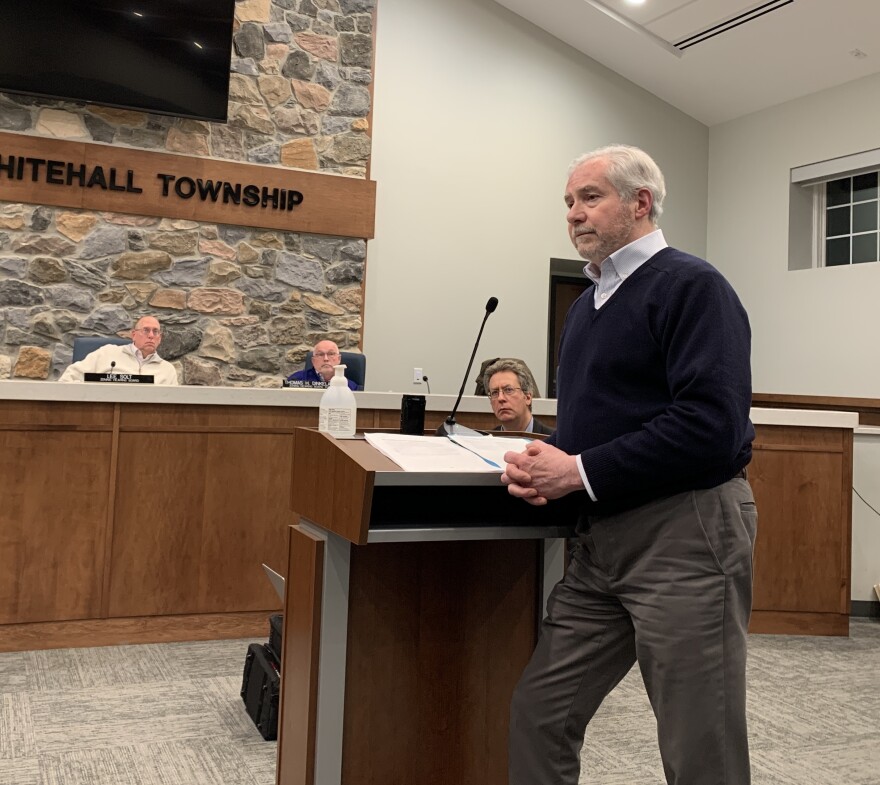SOUTH WHITEHALL TWP., Pa. — People who have lived in a drug and alcohol recovery house, or knew someone who had, testified at a zoning hearing Tuesday that a facility proposed next to Cetronia Elementary School would offer a needed environment for people to overcome addiction.
But the school's principal spoke of concern about the proposed facility's proximity to children, unauthorized people coming onto the school grounds, and its zero tolerance policy for drugs and alcohol.
Three of the four witnesses were called by the lawyer for the applicant, Moyer Construction LLC.
- Witnesses for applicant Moyer Construction LLC and Parkland School District testified at the latest hearing about the proposed recovery house near Cetronia Elementary School
- The witnesses spoke about the operations of recovery houses and the proximity to the elementary school
- Residents likely will be able to comment at the next hearing, at 7 p.m. Feb. 9 in the township municipal building
Brianna Aletras-Dunn testified that she lived in a recovery house operated by Rios Recovery LLC, who would operate the proposed facility. She said she has been sober for three years and now is a certified recovery specialist.
“Having that support there that I would not have had anywhere else is what kept me on track with my own recovery,” Aletras-Dunn said.

The proposed recovery house is controversial because it would be next to Cetronia Elementary School at 3599 Broadway.
The facility's location used to be Trexler Park Manor, an assisted-living facility that closed in 2014. It's been vacant since.
Township zoning laws that cover the property allow for an assisted living facility, and Moyer Construction LLC argues that a recovery house is sufficiently similar in character.
Recovery houses are privately owned homes for people recovering from drug or alcohol addiction — typically for people exiting drug rehabilitation programs. The facilities typically have a sobriety requirement.
They can be certified by the state, but that's not required for them to be certified to operate.
Zoning hearings function like a court, with opening statements, sworn witnesses called to testify and cross-examinations.
Zoning Hearing Board Member Lee Solt presided over the meeting as the hearing officer — a change that was decided at an earlier Zoning Hearing Board meeting because of issues meeting a quorum.
Witness testimonies
During her testimony, Aletras-Dunn spoke about what it was like at the recovery houses in which she lived. She said recovery houses have some more structure than living alone — such as a curfew and house managers who enforce house rules — but residents are mostly responsible for themselves.
“The idea is that you're learning how to live as an adult who's not using substances, while also having structure,” Aletras-Dunn said.
Another witness for the applicant, Jeremy Corra, is a house manager at a Rios Recovery LLC recovery house. He said along with making sure residents follow house rules, he provides emotional support.

“All the guys feel comfortable opening up to me," Corra said. "So if they got trouble going on with a family member, spouse, girlfriend, whatever it may be, they kind of come to me."
Robert Livingston, another witness for the applicant, is the strategic advisor for Bridge Beyond Addiction, an organization that provides financial support for people looking to live in recovery houses.
“Addiction lives in isolation… But when it's brought into a community, surrounded by others who have been there before, that's where the connection is. And that's where sobriety can be found."Robert Livingston, strategic advisor for Bridge Beyond Addiction
Livingston founded a group for parents whose children struggle with addiction. He said from the stories he has heard, he thinks people tend to have an easier time becoming sober when they live in a recovery house because they provide community.
“Addiction lives in isolation… But when it's brought into a community, surrounded by others who have been there before, that's where the connection is," Livingston said. "And that's where sobriety can be found."

Parkland School District attorney Matthew Deschler called one witness: Cetronia Elementary Principal James Giaquinto. Giaquinto spoke about how close the proposed recovery house would be to where children are during the day.
Giaquinto said there is a zero tolerance policy for drugs and alcohol on school grounds. He also said unauthorized people coming onto school grounds is a concern, and the school takes many measures to ensure the safety of the students.
“School safety is very important. It’s an all-in effort,” Giaquinto said.
Giaquinto did not provide any comment specifically about recovery houses.
Resident controversy
There was controversy on social media surrounding the location of the proposed recovery house when the issue first came before the zoning hearing board. A Facebook post about it was shared more than 50 times.
The comments included residents who opposed the construction of the facility because of its location near the school. Others supported it, saying recovery houses are needed in the area.
The first hearing on the matter was held on Dec. 1. At the second hearing on Jan. 5, two witnesses argued in favor of the recovery house.
The next hearing on the issue will be at 7 p.m. Feb. 9 in the municipal building. After the testimonies of at least two other witnesses, residents likely will have the opportunity to comment at the hearing, zoning board solicitor Thomas Dinkelacker said.


